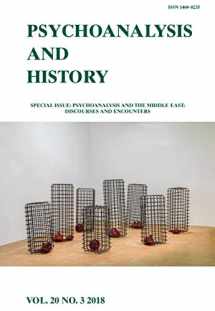
Psychoanalysis and the Middle East: Discourses and Encounters: Psychoanalysis and History Volume 20, Issue 3
ISBN-13:
9781474439701
ISBN-10:
1474439705
Edition:
1
Author:
Omnia El Shakry, Sara Pursley, Caroline McKusick
Publication date:
2018
Publisher:
Edinburgh University Press
Format:
Paperback
122 pages
FREE US shipping
Book details
ISBN-13:
9781474439701
ISBN-10:
1474439705
Edition:
1
Author:
Omnia El Shakry, Sara Pursley, Caroline McKusick
Publication date:
2018
Publisher:
Edinburgh University Press
Format:
Paperback
122 pages
Summary
Psychoanalysis and the Middle East: Discourses and Encounters: Psychoanalysis and History Volume 20, Issue 3 (ISBN-13: 9781474439701 and ISBN-10: 1474439705), written by authors
Omnia El Shakry, Sara Pursley, Caroline McKusick, was published by Edinburgh University Press in 2018.
With an overall rating of 4.4 stars, it's a notable title among other
books. You can easily purchase or rent Psychoanalysis and the Middle East: Discourses and Encounters: Psychoanalysis and History Volume 20, Issue 3 (Paperback) from BooksRun,
along with many other new and used
books
and textbooks.
And, if you're looking to sell your copy, our current buyback offer is $0.3.
Description
This special issue stages an encounter between psychoanalysis and the Middle East by reopening the psychoanalytic canon to consider key concepts through unexpected interlocutors, religious traditions, and intellectual formations. This includes bringing Islamic philosophical concepts of the Cloud to bear on conceptions of causality and après coup; and thinking from the point of view of the Last Judgment in dialogue with the therapeutic work of a Moroccan imam and the Lacanian analyst Fouad Benchekroun. Authors also recover lesser known histories of psychoanalytic theory: in the work of Egyptian psychoanalyst Sami-Ali, who developed a distinctly expansive theory of the imaginary influenced by Islamic apophatic theology and his own clinical work; and in Iraqi sociologist Ali al-Wardi's critical reevaluation of the unconscious, via the Islamic revolutionary tradition, as a source of the miraculous. Moving to the contemporary era, chapters tackle the various uses of psychoanalysis in 'dialogue initiatives' that delegitimize Palestinians' use of violence in Palestine/Israel; and in efforts to 'lay on the couch' the figure of the jihadi in contemporary France in the service of a secular modernizing project. Engaging critical theory, history, anthropology, and Islamic studies, this special issue will be of interest to all those concerned with psychoanalysis in relation to a geopolitical elsewhere. The special issue joins a growing literature on psychoanalysis and the Middle East. It stands out insofar as it brings together ethnographic, historical, literary, and theological perspectives in a single volume. Prominent scholars of psychoanalysis and Islam, including Joan Copjec and Stefania Pandolfo, provide a contextually-informed, theoretically rich account of psychoanalysis in the Middle East and in Islam. This body of work demonstrates the extent to which the relationship between Europe and the Middle East has been a site of productive engagement for psychoanalysis. Challenging assumptions of Europe as the metropolitan source of psychoanalytic concepts and thought, chapters contribute to a move away from Eurocentric histories and theoretical perspectives towards a global and transnational account of psychoanalysis. This interdisciplinary special issue will be of interest to scholars of psychology, psychoanalysis, Middle Eastern studies, Islamic studies, religious studies, history, anthropology, sociology, and postcolonial studies.


We would LOVE it if you could help us and other readers by reviewing the book
Book review

Congratulations! We have received your book review.
{user}
{createdAt}
by {truncated_author}


